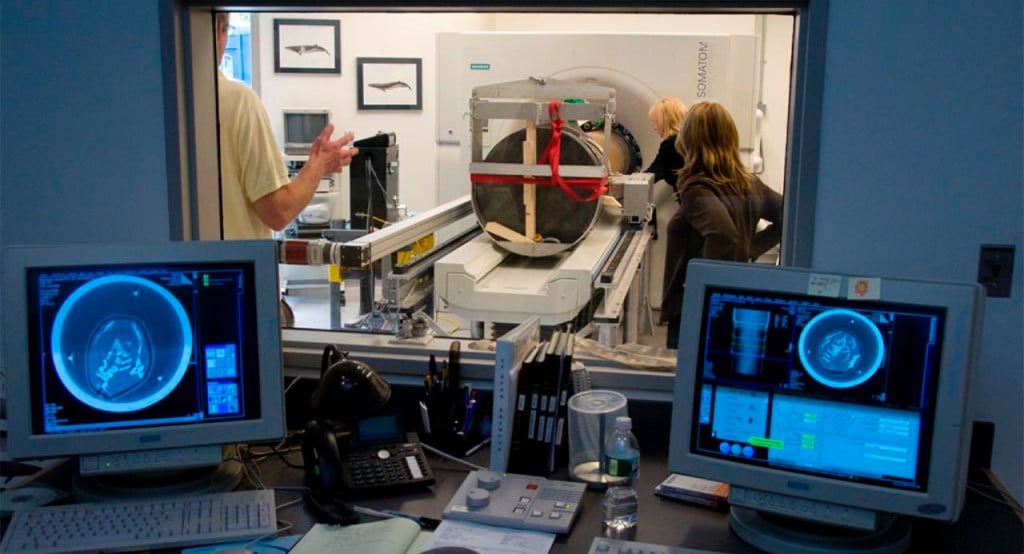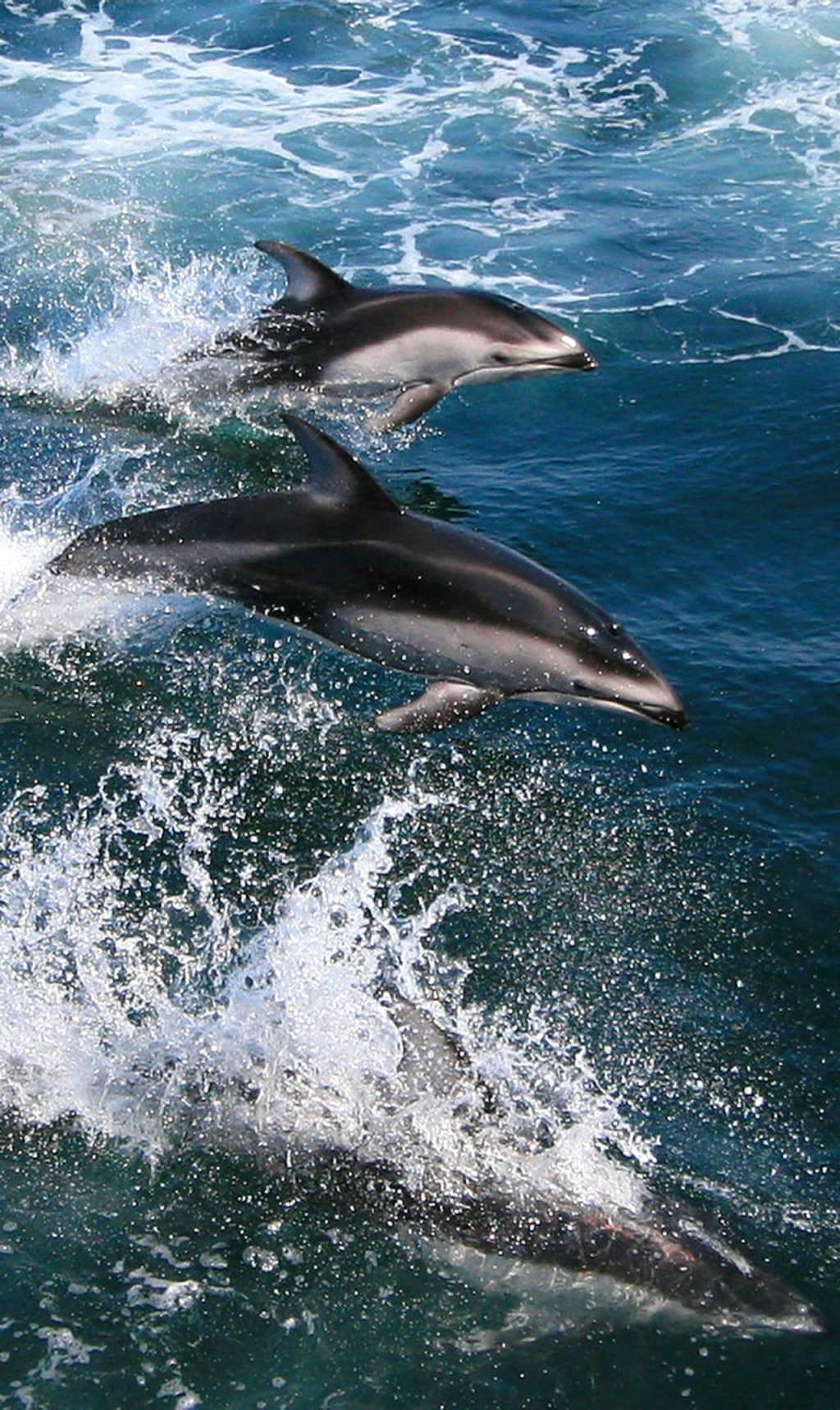Marine Life & Conservation
How Do Marine Mammals Avoid the Bends?

Study offers new hypothesis and highlights role that sonar plays in strandings
Deep-diving whales and other marine mammals can get the bends—the same painful and potentially life-threatening decompression sickness that strikes scuba divers who surface too quickly. A new study offers a hypothesis of how marine mammals generally avoid getting the bends and how they can succumb under stressful conditions.
The key is the unusual lung architecture of whales, dolphins and porpoises (and possibly other breath-holding diving vertebrates), which creates two different pulmonary regions under deep-sea pressure, say researchers at the Woods Hole Oceanographic Institution (WHOI) and the Fundacion Oceanografic in Spain. Their study was published April 25, 2018, in the journal Proceedings of the Royal Society B.
“How some marine mammals and turtles can repeatedly dive as deep and as long as they do has perplexed scientists for a very long time,” says Michael Moore, director of the Marine Mammal Center at WHOI and co-author of the study. “This paper opens a window through which we can take a new perspective on the question.”
When air-breathing mammals dive to high-pressure depths, their lungs compress. That collapses their alveoli—the tiny sacs at the end of the airways where gas exchange occurs. Nitrogen bubbles build up in the animals’ bloodstream and tissue. If they ascend slowly, the nitrogen can return to the lungs and be exhaled. But if they ascend too fast, the nitrogen bubbles don’t have time to diffuse back into the lungs. Under less pressure at shallower depths, the nitrogen bubbles expand in the bloodstream and tissue, causing pain and damage.
Marine mammals’ chest structure allows their lungs to compress. Scientists have assumed that this passive compression was marine mammals’ main adaptation to avoid taking up excessive nitrogen at depth and getting the bends.
In their study, the researchers took CT images of a deceased dolphin, seal, and a domestic pig pressurized in a hyperbaric chamber. The team was able to see how the marine mammals’ lung architecture creates two pulmonary regions: one air-filled and the other collapsed. The researchers believe that blood flows mainly through the collapsed region of the lungs. That causes what is called a ventilation-perfusion mismatch, which allows some oxygen and carbon dioxide to be absorbed by the animal’s bloodstream, while minimizing or preventing the exchange of nitrogen. This is possible because each gas has a different solubility in the blood. The terrestrial pig did not show that structural adaptation.
This mechanism would protect cetaceans from taking up excessive amounts of nitrogen and thus minimize risk of the bends, says lead author Daniel García-Parraga of the Fundacion Oceanografic. However, he said, “Excessive stress, as may occur during exposure to human-made sound, may cause the system to fail and increase blood to flow to the air-filled regions. This would enhance gas exchange, and nitrogen would increase in the blood and tissues as the pressure decreases during ascent.”
Scientists once thought that diving marine mammals were immune from decompression sickness, but a 2002 stranding event linked to navy sonar exercises revealed that 14 whales that died after beaching off the Canary Islands had gas bubbles in their tissues—a sign of the bends. The researchers say the paper’s findings could support previous implications of decompression sickness in some cetacean mass strandings associated with navy sonar exercises.
The team says further research will require the development of tools to analyze how lung blood flow and ventilation patterns change with various stressors during diving.
This work was supported by funding from the Fundacion Oceanografic and the Office of Naval Research.
The Woods Hole Oceanographic Institution is a private, non-profit organization on Cape Cod, Mass., dedicated to marine research, engineering, and higher education. Established in 1930 on a recommendation from the National Academy of Sciences, its primary mission is to understand the ocean and its interaction with the Earth as a whole, and to communicate a basic understanding of the ocean’s role in the changing global environment.
For more information, please visit www.whoi.edu.
Marine Life & Conservation
Double Bubble for Basking Sharks

 The Shark Trust is excited to announce that, for two more days only, all donations, large or small, will be doubled in the Big Give Green Match Fund!
The Shark Trust is excited to announce that, for two more days only, all donations, large or small, will be doubled in the Big Give Green Match Fund!
Donate to Basking in Nature: Sighting Giants
The Shark Trust is hoping to raise £10k which will be doubled to £20k. This will go towards Basking in Nature: Sighting Giants. And they need YOUR help to reach they’re goal.
The Shark Trust’s citizen science project is to monitor and assess basking sharks through sightings; encouraging data collection, community engagement, and promoting nature accessibility. This initiative aims to enhance health and wellbeing by fostering a deeper connection with British Sharks.
Campaign Aims
- Increase citizen science reporting of Basking Sharks and other shark sightings to help inform shark and ray conservation.
- Provide educational talks about the diverse range of sharks and rays in British waters and accessible identification guides!
- Create engaging and fun information panels on how to ID the amazing sharks and rays we have on our doorstep! These can be used on coastal paths around the Southwest. With activities and information on how you can make a difference for sharks and rays!
- Promote mental wellbeing through increasing time in nature and discovering the wonders beneath the waves!
Donate, and double your impact. Click Here
Marine Life & Conservation
Leading UK-based shark conservation charity, the Shark Trust, is delighted to announce tour operator Diverse Travel as a Corporate Patron

 Corporate Patrons provide a valuable boost to the work of The Shark Trust. The Trust team works globally to safeguard the future of sharks, and their close cousins, the skates and rays, engaging with a global network of scientists, policymakers, conservation professionals, businesses and supporters to further shark conservation.
Corporate Patrons provide a valuable boost to the work of The Shark Trust. The Trust team works globally to safeguard the future of sharks, and their close cousins, the skates and rays, engaging with a global network of scientists, policymakers, conservation professionals, businesses and supporters to further shark conservation.
Specialist tour operator Diverse Travel has operated since 2014 and is committed to offering its guests high quality, sustainable scuba diving holidays worldwide. Working together with the Shark Trust will enable both organisations to widen engagement and encourage divers and snorkellers to actively get involved in shark conservation.
“Sharks are truly at the heart of every diver and at Diverse Travel, we absolutely share that passion. There is nothing like seeing a shark in the wild – it’s a moment that stays with you forever!” says Holly Bredin, Sales & Marketing Manager, Diverse Travel.
“We’re delighted to celebrate our 10th year of business by becoming a Corporate Patron of the Shark Trust. This is an exciting partnership for Diverse and our guests. We will be donating on behalf of every person who books a holiday with us to contribute towards their vital shark conservation initiatives around the world. We will also be working together with the Trust to inspire divers, snorkellers and other travellers to take an active role – at home and abroad – in citizen science projects and other activities.”
Paul Cox, CEO of The Shark Trust, said:
“It’s an exciting partnership and we’re thrilled to be working with Diverse Travel to enable more divers and travellers to get involved with sharks and shark conservation. Sharks face considerable conservation challenges but, through collaboration and collective action, we can secure a brighter future for sharks and their ocean home. This new partnership takes us one more valuable step towards that goal.”
For more information about the Shark Trust visit their website here.
For more about Diverse Travel click here.
-

 News3 months ago
News3 months agoHone your underwater photography skills with Alphamarine Photography at Red Sea Diving Safari in March
-

 News3 months ago
News3 months agoCapturing Critters in Lembeh Underwater Photography Workshop 2024: Event Roundup
-

 Marine Life & Conservation Blogs3 months ago
Marine Life & Conservation Blogs3 months agoCreature Feature: Swell Sharks
-

 Blogs2 months ago
Blogs2 months agoMurex Resorts: Passport to Paradise!
-

 Blogs2 months ago
Blogs2 months agoDiver Discovering Whale Skeletons Beneath Ice Judged World’s Best Underwater Photograph
-

 Gear Reviews2 weeks ago
Gear Reviews2 weeks agoGEAR REVIEW – Revolutionising Diving Comfort: The Sharkskin T2 Chillproof Suit
-

 Marine Life & Conservation2 months ago
Marine Life & Conservation2 months agoSave the Manatee Club launches brand new webcams at Silver Springs State Park, Florida
-

 Gear Reviews3 months ago
Gear Reviews3 months agoGear Review: Oceanic+ Dive Housing for iPhone







